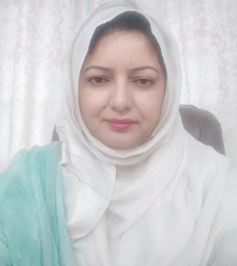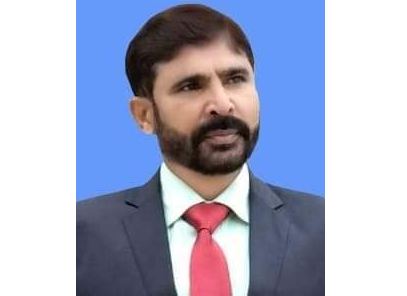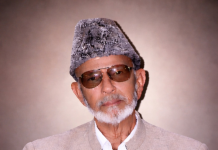Dr. Muhammad Akram Zaheer
International Literacy Day is an annual commemoration observed on the 8th of September, which serves to underscore the significance of literacy as an inherent human entitlement and a pivotal constituent of sustainable development. This occasion was established by the United Nations Educational, Scientific, and Cultural Organization (UNESCO) back in 1966 and it has been globally celebrated ever since.
The Literacy Department of Sahiwal District marked this event within the premises of the Sahiwal District Council Hall to champion the cause of literacy. The event was presided over by the District Education Officer (Literacy) for Sahiwal, Mrs. ShaziaIqbal and attended by a diverse array of participants, including notable figures such as Chaudhry Muhammad Ikram CEO (DEA) Sahiwal, Dr. Muhammad AkramZaheer from the University of Okara, KashifRiaz, President of the Sahiwal Chamber of Commerce and Industry, Haji Abdul Tahir, representatives from the Education Department, law experts, members of the media, educators, and students.
The distinguished guest, Deputy Commissioner of Sahiwal, Mr. IkramulHaq, along with other honored guests, delivered their addresses to the assembly gathered for this ceremonial occasion. Deputy Commissioner IkramulHaq underscored the state’s obligation to provide education and affirmed that access to education is the entitlement of every citizen. He lamented the disparity in literacy rates in our nation compared to other countries, expressing deep concern about this issue.
He accentuated the necessity for altering our priorities, with a heightened focus on education, and the allocation of increased resources to the education sector. Additionally, he emphasized the profound importance Islam places on the acquisition of knowledge and stressed that despite facing multifarious challenges; our nation must confront them resolutely and forge ahead. He called for collective efforts to ensure that no child is denied access to education and that this message permeates every household.
In her address, Mrs. ShaziaIqbal, the District Education Officer (Literacy), articulated that education stands as the panacea for all societal issues. Consequently, in remote areas lacking basic educational facilities, non-formal education is being dispensed through informal schools. She pointed out that these establishments cater to children who, due to various constraints, are unable to enroll in conventional schools.
These initiatives afford these children the opportunity to receive an education and subsequently become productive citizens contributing to the nation’s progress. She underscored that these children, who are unable to attend formal institutions due to compelling circumstances, can attain an education through literacy and non-formal education centers, thus equipping them to become efficacious members of society and contributors to the nation’s development.
Dr. Muhammad AkramZaheer from the University of Okara expounded that literacy encompasses not merely the capacity to read and write, but it is also indispensable for personal development, social inclusion, and lifelong learning. Literacy serves as the foundational skill facilitating access to education. The celebration of this day reinforces the nexus between literacy and education to emphasize the pivotal role of literacy in enabling individuals to engage effectively in formal learning settings, attain academic success, and progress in their careers. Furthermore, literacy is inextricably linked to economic advancement and the amelioration of poverty.
Illiteracy can perpetuate poverty by limiting access to employment opportunities and economic participation. Promoting literacy through initiatives and awareness campaigns can contribute to breaking the cycle of poverty and enhancing overall quality of life. Illiteracy can engender social exclusion, as individuals lacking basic literacy skills may encounter challenges in fully participating in their communities, accessing crucial information, and advocating for their rights. International Literacy Day promotes the idea that literacy is a tool for empowering individuals and fostering social inclusion.
In the context of sustainable development, literacy is acknowledged as one of the Sustainable Development Goals (SDGs) established by the United Nations. Specifically, SDG 4 seeks to “ensure inclusive and equitable quality education and promote lifelong learning opportunities for all.” International Literacy Day aligns with this goal by championing literacy as an integral element of global sustainable development endeavors. Governments, organizations, and communities employ International Literacy Day as an opportunity to launch and showcase various literacy programs, initiatives, and projects.
It furnishes a platform for deliberating strategies to address literacy challenges and for sharing success stories and best practices. By designating a dedicated day for celebrating literacy, the international community can draw attention to the worldwide literacy crisis and the millions of individuals still devoid of basic reading and writing skills. This heightened awareness catalyzes the mobilization of resources and support for literacy-related initiatives.
To culminate the event, certificates of appreciation were distributed to both educators and students in recognition of their commendable efforts. Deputy Commissioner IkramulHaq and other participants were bestowed with a commemorative shields and certificates as a token of appreciation by District Education Officer (Literacy), Mrs. ShaziaIqbal.

Madam Shazia IqbalDistrict Education Officer (Literacy)Sahiwal

















